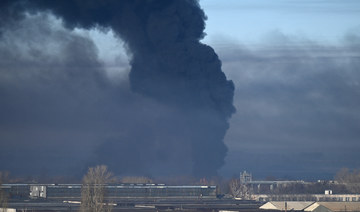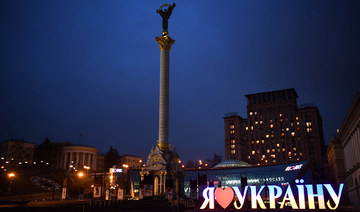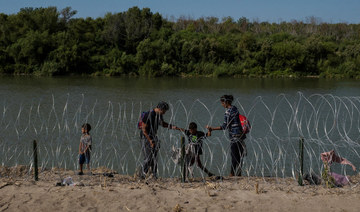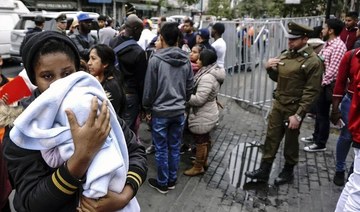BRUSSELS: The European Union is planning the “strongest, the harshest package” of sanctions it has ever considered at an emergency summit Thursday as the Russian military attacked Ukraine and world leaders reacted with outrage at Moscow’s actions.
European Commission President Ursula von der Leyen said that “the target is the stability in Europe and the whole of the international peace order, and we will hold President (Vladimir) Putin accountable for that.”
“We will present a package of massive and targeted sanctions to European leaders for approval,” she said.
EU foreign policy chief Josep Borrell called it the “strongest, the harshest package” ever considered.
“A major nuclear power has attacked a neighbor country and is threatening reprisals of any other states that may come to the rescue,” Borrell said. “This is not only the greatest violation of international law, it’s a violation of the basic principles of human co-existence. It’s costing many lives with unknown consequences ahead of us. The European Union will respond in the strongest possible terms.”
Von der Leyen said the “massive and targeted sanctions” she will put to EU leaders “will target strategic sectors of the Russian economy by blocking the access to technologies and markets that are key for Russia.”
She said the sanctions, if approved, “will weaken Russia’s economic base and its capacity to modernize. And in addition, we will freeze Russian assets in the European Union and stop the access of Russian banks to European financial financial markets.”
Like the first package of sanctions that were imposed when Russia recognized the two breakaway eastern Ukrainian republics, von der Leyen said all Western powers were walking in lockstep.
“We are closely aligned with our partners and allies the United States, the United Kingdom, Canada, but also, for example, Japan and Australia,” she said.
British Prime Minister Boris Johnson said Western allies won’t stand by as Russia attacks Ukraine.
In an early morning call, Johnson told Ukrainian President Volodymyr Zelensky that he was appalled by events in Ukraine, according to a statement released by the prime minister’s office.
“The Prime Minister said the West would not stand by as President Putin waged his campaign against the Ukrainian people,” Johnson’s office said in the statement.
Johnson added that Ukraine was in the thoughts of everyone in the UK “during this dark time.”
French President Emmanuel Macron, who had labored until the last minute for a diplomatic solution, said “France firmly condemns Russia’s decision to wage war,” and promised support for Ukraine.
“Russia must end its military operations immediately,” Macron said.
The turmoil from the beginning of a long-feared act of aggression rippled from Europe to Asia. Stock markets plunged, oil prices surged, and European aviation officials warned of a high risk to civilian aircraft over Ukraine, reminding air operators that “this is now an active conflict zone.”
The London Stock Exchange’s leading FTSE 100 index plunged more than 200 points, or 2.7 percent, within moments of opening following Russia’s actions in Ukraine.
In New York, the UN Security Council held an extraordinary emergency meeting meant to dissuade Russia from sending troops into Ukraine. Secretary-General Antonio Guterres’ plea to “give peace a chance” came just as Russian President Vladimir Putin appeared on Russian TV to announce a military operation that he maintained was to protect civilians in Ukraine.
Putin, who said that rebels in eastern Ukraine had asked Moscow for military assistance, warned other countries that any effort to interfere with the Russian operation would lead to “consequences they have never seen.”
As leaders across Asia and Europe scrambled to condemn the attack, explosions were heard in Kyiv and other cities in Ukraine. Nations around the world this week have also imposed a raft of new sanctions on Russia.
Moscow had massed more than 150,000 troops on Ukraine’s borders. On Monday, Putin recognized the independence of two separatist regions in eastern Ukraine and ordered Russian forces there for what he called “peacekeeping.” Guterres at the UN disputed that, saying the troops were entering another country without its consent.
German Chancellor Olaf Scholz called Russia’s attack “a terrible day for Ukraine and a dark day for Europe” and “a blatant violation of international law. It cannot be justified by anything.”
In a bulletin Thursday, the European Union Aviation Safety Agency said “there is a risk of both intentional targeting and misidentification of civil aircraft” and that “the presence and possible use of a wide range of ground and airborne warfare systems poses a HIGH risk for civil flights operating at all altitudes and flight levels.”
Asian stock markets were in turmoil.
Market benchmarks in Tokyo and Seoul fell 2 percent and Hong Kong and Sydney lost more than 3 percent Thursday. Oil prices jumped nearly $3 per barrel on unease about possible disruption of Russian supplies.
Earlier, Wall Street’s benchmark S&P 500 index fell 1.8 percent to an eight-month low.
Russia seized Ukraine’s Crimea Peninsula in 2014, and pro-Russia rebels have since been fighting Ukrainian forces in the eastern areas of Donetsk and Luhansk. More than 14,000 people have been killed in the conflict.
Czech Prime Minister Petr Fiala condemned the Russian attack as “absolutely unjustified act of aggression against a sovereign state.” Slovakia Prime Minister Eduard Heger called it “an unjustified barbarian act.”
Many world capitals were trying to determine just what was happening in the tense and fast-changing early moments of a chaotic and violent event.
“We are putting all our effort into collecting the information and comprehending the situation,” Japanese Prime Minister Fumio Kishida said shortly after Putin’s announcement. “It’s important and challenging to secure the safety of Japanese people (in Ukraine). After fully comprehending the situation, we will handle the case properly.”
Asked whether Taiwan would cooperate with the US and like-minded countries to put export controls on semi-conductors and technology products that the self-ruled island is known for, Foreign Ministry spokesperson Joanne Ou said “they were in close coordination” and would take the “appropriate actions in response to help Ukraine and uphold the area’s peace and stability.”
China, which has denounced sanctions against Russia, advised its citizens in Ukraine to stay home and place a Chinese flag in or on their vehicles if they need to travel long distances.
“Social order is chaotic and out of control, especially in the cities where at times of serious unrest, walking on the streets could make one a target of attack, traffic could be stopped at any time and venturing out creates the possibility of running into uncontrollable risks,” the notice said.
China has increasingly aligned its foreign policy with Russia to challenge the West, and has blamed the United States and its allies for provoking Moscow.
Australian Prime Minister Scott Morrison said sanctions against Russia would become law Friday but would not take effect until the end of March. He said the time was needed to give “opportunities for businesses that have had very legitimate operations and business interests in Russia and in the affected territories of Ukraine to be able to make changes to their arrangements.”
Morrison said that financial sanctions and travel bans that target eight members of the Russian Security Council will be a first batch of measures in response to Russian aggression toward Ukraine. Australia will also align with the US and Britain by targeting two Russian banks.
“The reason we’re doing this is there must be a price for the unprovoked, unlawful, unwarranted, unjustified attacks and threats and intimidation that has been imposed by Russia on Ukraine. This cannot be a consequence-free action by Vladimir Putin and the Russian regime,” Morrison said.
EU plans ‘harshest’ sanctions package ever against Russia
https://arab.news/4wmfc
EU plans ‘harshest’ sanctions package ever against Russia
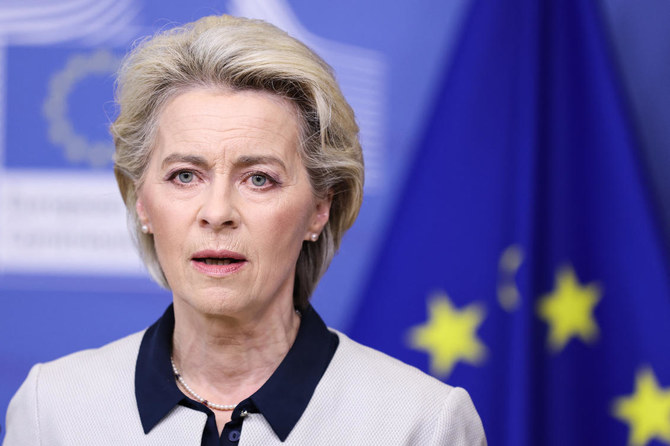
- EU foreign policy chief Josep Borrell called it the “strongest, the harshest package” ever considered
- British Prime Minister Boris Johnson said Western allies won’t stand by as Russia attacks Ukrain
Indians vote early in fifth phase of polls to avoid scorching heat

MUMBAI/BHUBANESWAR: Indians began voting early on Monday in the fifth phase of mammoth general elections, with thousands queuing at polling stations to beat the scorching heat in the financial capital of Mumbai and the sprawling states of Uttar Pradesh and Odisha.
The world’s largest election began on April 19, amid high summer temperatures, with the weather office predicting more days of heatwaves than usual through the season.
Votes will be counted on June 4, with Prime Minister Narendra Modi expected to win a rare third consecutive term.
“Given the hot and humid conditions, there could have been fans and better arrangements for the ill and those with disabilities,” said Sangeeta Rege, 46, a director at a health research organization.
She was speaking after two senior citizens collapsed at her polling station in Mumbai temperatures of 33 degrees Celsius (91.4 Fahrenheit) and humidity of 71 percent that made it difficult for many, especially the elderly, to set foot outdoors.
Nearly a billion people are eligible to vote in India’s elections, but after poor initial turnout in early phases, more exercised the franchise to take the average of the first four rounds to 66.95 percent, with 69 percent voting in the May 13 fourth phase.
Monday’s phase has the fewest constituencies going to the polls, with 89.5 million voters set to pick representatives for 49 seats.
High-profile candidates in the fray on Monday include trade minister Piyush Goyal, standing from one of six seats in Mumbai, and defense minister Rajnath Singh from Lucknow, both cities where there has been poor voter turnout in the past.
On Sunday, the Election Commission specifically urged residents of both cities “to erase the stigma” of urban apathy.
“At the core of our vision for Mumbai is – better infrastructure and more ‘ease of living,” Prime Minister Narendra Modi said while campaigning in the city last week.
GANDHI FAMILY BASTIONS
Two boroughs of the opposition Congress party’s Nehru-Gandhi dynasty are also going to the polls in the large politically crucial northern state of Uttar Pradesh.
Family scion Rahul Gandhi is contesting the seat of Raebareli, in addition to Wayanad in the south, which has already voted.
Smriti Irani, minister for women and child development, is contesting from Amethi, where she defeated Rahul Gandhi in 2019, to take a seat his family held almost continuously for the last four decades.
Other keenly watched contests in the state include Kaiserganj, where the BJP is fielding the son of a former wrestling federation chief, although the father has been charged with sexually harassing female wrestlers.
Poor voter turnout became a concern for the ruling BJP initially, and analysts believe the low numbers cast doubts on the landslide victory the party and its allies sought.
But long queues snaked out of polling booths in Mumbai and Bolangir in the eastern state of Odisha after the weather department forecast maximum temperatures to rise between 2 degrees and 4 degrees Celsius.
The election aimed “to ensure stability and security ... plus development of my city and country which ... is happening at a rapid rate,” said Mumbai homemaker Jaya Roy Chowdhury, 48.
“The BJP has not fielded the right candidate for the Lok Sabha, but we are voting ... with Modi in mind,” said 55-year-old Odisha farmer Girish Mishra, referring to the lower house of parliament.
Modi, accused by opponents of targeting minority Muslims to please hard-line voters, resolved in a television interview aired after the fourth phase to “not do Hindu-Muslim (in politics).”
He has repeatedly accused the Congress of plans to extend welfare benefits to Muslims at the expense of disadvantaged tribal groups and Hindu castes, a claim the opposition party has denied.
London court set to rule on Julian Assange extradition

- The 52-year-old Australian is seeking permission to appeal against a ruling allowing him to be sent to face a US trial on espionage charges
London: WikiLeaks founder Julian Assange could find out on Monday whether he has won a reprieve in his last-ditch legal battle to avoid extradition from Britain to the United States.
The 52-year-old Australian is seeking permission to appeal against a ruling allowing him to be sent to face a US trial on espionage charges, after a long-running court saga.
Two London High Court judges handling Assange’s request adjourned the case in March, asking US government lawyers to give “satisfactory assurances” about free speech protections and that he would not face the death penalty if convicted.
Those submissions are expected to be presented at a hearing on Monday, and the judges could rule immediately afterwards.
If successful, Assange will be able to go back to domestic UK courts.
If he loses, Assange could be swiftly extradited after a five-year legal battle that has pitted the Washington and London governments against free-speech campaigners.
Assange’s only hope would then be to appeal to the European Court of Human Rights, which could order a stay on the extradition if it decides there are “exceptional circumstances.”
It would also require London to accept the order. This is uncertain because of a separate dispute with the European court which blocked the government’s plan to send asylum seekers to Rwanda.
Dozens of Assange supporters gathered outside the Royal Courts of Justice in central London early Monday, many wearing T-shirts bearing Assange’s face.
“This man’s life is at stake,” 83-year-old sculptor Jenny West told AFP.
“He represents all other journalists, it’s a pressing humanitarian situation,” she added.
Assange has been detained in the high-security Belmarsh Prison in London since April 2019.
He was arrested after spending seven years holed up in Ecuador’s London embassy to avoid extradition to Sweden, where he faced accusations of sexual assault that were eventually dropped.
US authorities want to put the publisher on trial for divulging US military secrets about the wars in Iraq and Afghanistan.
Assange is accused of publishing some 700,000 confidential documents relating to US military and diplomatic activities, starting in 2010.
The United States has accused Assange under the 1917 Espionage Act, which his supporters warn mean he could be sentenced to 175 years in prison.
UK courts approved the extradition request after the United States vowed that Assange would not go to its most extreme prison, “ADX Florence,” nor to subject him to the harsh regime known as “Special Administrative Measures.”
His supporters have criticized the legal proceedings he has faced.
“It is abundantly clear of course that the process in the court in the United Kingdom is corrupt. The case is rigged against Julian,” Kristinn Hrafnsson, WikiLeaks’ editor-in-chief, told reporters last Wednesday.
Stella Assange said she hoped her husband would be present at Monday’s hearing but added that she did not expect the judges to rule in his favor.
“I don’t expect a rational outcome from the courts, I’m afraid to say,” she said.
Assange’s supporters say his health is fragile and the Council of Europe this week voiced concern about his treatment.
The United States indicted Assange multiple times between 2018 and 2020 but President Joe Biden has faced domestic and international pressure to drop the case filed under his predecessor Donald Trump.
Biden indicated recently that the United States was considering an Australian request to drop the charges.
“President Biden has the chance still to be the president who put an end to this, who acted in the interest of press freedom in journalism,” said Rebecca Vincent, of Reporters Without Borders (RSF).
Daesh claims attack in Afghanistan that killed 3 Spanish citizens and 3 Afghans

- The Daesh group issued statements on its Aamaq news agency late Sunday
- Seven people were wounded in the attack on Friday in on Bamiyan province, a major tourist area
ISLAMABAD: The Daesh group has claimed responsibility for an attack on foreigners in central Afghanistan last week in which three Spanish citizens and three Afghans were killed.
Seven people were wounded in the attack on Friday in on Bamiyan province, a major tourist area, according to Abdul Mateen Qani, a spokesman for the interior minister. He said seven suspects were arrested at the scene.
The Daesh group issued statements on its Aamaq news agency late Sunday that said its fighters attacked a bus carrying tourists and their guides. “The attack was in response to the IS leaders’ directions to target citizens of the European Union wherever they are found,” it said.
Spain’s Foreign Ministry said three Spaniards died and at least one more had been wounded. A Taliban official in Bamiyan, who spoke on condition of anonymity because he was not authorized to speak to the media, said the four wounded foreigners were from Spain, Norway, Australia and Latvia.
Spanish Prime Minister Pedro Sánchez wrote on social media platform X that he was “overwhelmed” by the news.
Qani said that all those who were wounded have been transferred to capital of Kabul for treatment and they are stable condition.
The Daesh group’s affiliate in Afghanistan is a major Taliban rival and its militants have attacked schools, hospitals, mosques and minority Shiite areas throughout the country.
The Taliban seized power in Afghanistan in August 2021 as US and NATO forces were in the final weeks of their withdrawal from the country after 20 years of war.
The Taliban is seeking to increase the number of tourists coming to the country. In 2021, there were 691 foreign tourists; in 2022, that figure rose to 2,300; and last year, it topped 7,000.
Bamiyan was the site of two massive Buddha statues carved into a cliff between the 4th and 6th century and which were destroyed by the Taliban at Al-Qaeda’s urging in early 2001.
Separately on Monday, a hand grenade exploded in the southern city of Kandahar, killing at least one civilian and wounding three, the Kandahar police chief’s office said.
Police were investigating the explosion near the road toward Kandahar airport, the statement said. No group has taken responsibility for the blast.
India begins voting in fifth phase as Mumbai, Gandhi family boroughs head to polls

- World’s largest election began on April 19 and will conclude on June 1
- Congress leader Rahul Gandhi is contesting from Raebareli, Wayanad seats
MUMBAI: India began voting in the fifth phase of its mammoth general elections on Monday, with seats in the financial capital Mumbai and the opposition’s Gandhi family bastions set to be sealed in the last few legs of the seven-phase vote.
The world’s largest election began on April 19 and will conclude on June 1, with votes set to be counted on June 4.
Monday’s phase has the least number of seats being contested, with 89.5 million voters set to choose representatives for 49 seats.
Several high-profile candidates are in the fray on Monday — including defense minister Rajnath Singh from Lucknow and trade minister Piyush Goyal from Mumbai — cities which have suffered from a dismal voter turnout in the past.
The Election Commission on Sunday specifically called upon residents of those cities “to erase the stigma” of urban apathy.
“At the core of our vision for Mumbai is – better infrastructure and more ‘ease of living,” Prime Minister Narendra Modi said while campaigning in the city last week, just days after at least 14 people were killed when a massive billboard fell during a rainstorm.
Two boroughs of the Congress party’s Nehru-Gandhi dynasty in the politically-crucial Uttar Pradesh are also going to polls, with scion Rahul Gandhi contesting the seat of Raebareli, in addition to Wayanad in the south which has already voted. India allows candidates to contest multiple constituencies but represent only one.
Sonia Gandhi, Congress party chief and former lawmaker from Raebareli, made an emotional appeal to voters asking them to vote for her son in a region that the Bhartiya Janata Party (BJP) has dominated in the last 10 years.
Smriti Irani, minister for women and child development, is contesting from Amethi. In 2019, she defeated Rahul Gandhi in a seat his family held continuously for the last four decades.
Among other keenly watched electorates in the state is Kaiserganj, where the BJP is fielding a former wrestling federation chief’s son, despite his father being charged with sexually harassing female wrestlers.
Poor voter turnout became a concern for the ruling BJP initially, and analysts believe the low numbers cast doubts on the landslide victory the party and its allies sought.
After an initial poor performance, more people started casting their vote with an average turnout of 66.95 percent in four phases, and 69 percent in the fourth one on May 13.
Modi, widely expected to return as prime minister for a third consecutive term, has been accused by opponents of targeting minority Muslims to please hard-line voters.
Modi has repeatedly accused the Congress party of planning to extend welfare benefits to Muslims at the expense of disadvantaged tribal groups and Hindu castes, a claim the Congress has denied.
In a recent television interview aired after the fourth phase, Modi said it was his resolve to “not do Hindu-Muslim (in politics).”
The opposition INDIA alliance, consisting of Congress and a dozen political parties, got a major boost after fierce Modi critic and Chief Minister of Delhi Arvind Kejriwal was given temporary relief by the court and allowed to campaign in the elections.
Pope Francis calls anti-migrant attitudes at US border ‘madness’

- Record numbers of migrants fleeing poverty and violence have been seeking to enter the US, largely from Central America and Venezuela
- The matter has emerged as a top political issue in the November US election, with Biden and challenger Trum, pushing the topic front and center
WASHINGTON: Pope Francis made a foray into the US election season with a rare television interview Sunday, calling harsh anti-migrant attitudes “madness” and criticizing right-wing US Catholic figures for overly conservative stances against his social teachings.
Speaking in his native Spanish through a translator for more than an hour, Francis told CBS News program “60 Minutes” that the closing by the state of Texas of a Catholic charity offering humanitarian assistance was absurd.
“That is madness. Sheer madness. To close the border and leave them there, that is madness. The migrant has to be received,” the pope said.
“Thereafter you see how you are going to deal with him. Maybe you have to send him back, I don’t know, but each case ought to be considered humanely,” Francis said.
Record numbers of migrants have been seeking to enter the United States, largely from Central America and Venezuela, as they flee poverty, violence and disasters exacerbated by climate change.
The matter has emerged as a top political issue in the November US election, with President Joe Biden’s Republican challenger, former president Donald Trump, pushing the topic front and center.
“The globalization of indifference” on migrants, Francis said, “is a very ugly disease.”
Francis, 87, also addressed criticisms by conservative US bishops who oppose his efforts to revisit certain teachings and traditions.
A “conservative is one who clings to something and does not want to see beyond that,” he said when asked about the bishops, adding “it is a suicidal attitude.”
Since his election in 2013, Pope Francis has insisted on the importance of a church open to all, including member of the LGBT community, but he has faced strong resistance from conservative Catholics.
There was a particularly strong reaction when Francis opened the door to the blessing of gay couples last year, especially in African countries.
Calling gay people “a human fact,” Francis said in the interview: “To bless each person, why not? The blessing is for all.”
The pontiff also touched on the controversial topic of sex abuse within the Catholic Church.
He has made combatting sexual assault in the Church one of the main missions of his papacy, and insisted on a “zero tolerance” policy following multiple wide-reaching scandals.
“Unfortunately, the tragedy of the abuses is enormous,” he told CBS, adding that abuse “cannot be tolerated.”
“When there is a case of a religious man or woman who abuses, the full force of the law falls upon them,” Francis said.
But, he added, “there has been a great deal of progress.”



